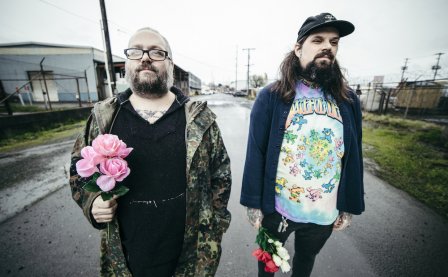In his plan of hell, Dante places suicides in the second ring of the seventh circle — the circle of violence. Here, harpies nest among the gnarled thorn trees that incarcerate the souls of those dead by their own hand. As the harpies feed on the leaves of these hapless trees, a fresh, inescapable agony shoots through the souls’ new-found bodies. Uniquely amongst the denizens of the Inferno, the suicides will not re-enter their bodies after the second coming. Their torments derive from their act: having given up their bodies, Dante’s metaphysical structure finds them a new one and fixes them in a dark forest, never to return to their original flesh. Likewise, when Hamlet contemplates suicide, he begs that his “too too solid flesh would melt, thaw, and resolve itself into a dew.” He yearns to escape the fixity of his embodiment, the position of his person within the unweeded garden of the world.
A similar sentiment occurs in the suicide note, read at the beginning of The Body’s “Hail To Thee, Everlasting Pain”: “Y’all have to live around all this craziness, and I’m gone.” Perhaps extreme music is the ideal method for sublimating an unfulfilled death drive: a fantasy of death’s fascinating potentiality that mediates our access to the truth of its nothingness, accreting in the process all the symbolism that attends our visions of mortality. It’s dark, fearful, rent by screams, discordant guitar, and pounding drums. More importantly, it lasts. Unlike death, which occurs in an instant, music unfolds through time, expanding this phantasmic death into an album-length experience, a succession of death moments, or better yet, a succession of moments that teach us to crave death. The Body’s music, here compounded by The Haxan Cloak’s Bobby Krlic, exemplifies this dual process of the suicide fantasy, evoking both the surrounding “craziness” and the terrifying march toward self-slaughter.
Drums, in their original use, were weapons of war. Snare drums kept terrified soldiers in lockstep as they moved forward, while deep basses and toms cut through the battlefield, announcing the arrival of death. Marching was a necessity in this sort of warfare, because it united the army in a single body, all walking together toward imminent death. In a sense, it enforced the soldiers’ suicide, pushing them onward toward the confrontation. Approaching drum sounds signaled inevitable doom at an invader’s hands, the terrifying chaos that was about to descend upon the victim. The Body’s Lee Buford seems to incorporate these functions in his commanding style. His exaggerated slowness and stupefying loudness combine into a quality both martial and primordial, establishing the death fear as a fundamental, pre-civilized response. Krlic’s programming shows that even electronics can feel deadly, organizing the beat into a martial, synthetic order: an industrial order, like a meat processing plant, like a death camp.
Krlic’s bass programming and Chip King’s guitar continue in this vein, standing in for the paralyzing sub-bass of a roaring beast and the cacophony of ambient chaos. But the most terrifying aspect of all, the one that most exemplifies the two halves of this death fantasy, is King’s vocals. Unlike most extreme metal vocalists, King doesn’t attempt to sound like a demon or beast or anything other than a human. His vocals sound like a person who actually embodies horror, alternating between murderer and victim. In their madness, he evokes both transgressive ecstasy and uncomprehending terror in a sound whose precedents come not from the musical world, but from the world of catastrophe reporting and horror films.
Ultimately, of course, this murder-suicide is painless. It’s an image of death, not its reality. And yet in its workings, it feels authentic, allowing the suspended reality to creep in on the fantasy. I Shall Die Here in part and parcel executes this thematic basis in a way unimaginable by metal bands who have calcified in their genre stations. As evidenced by their name, The Body is seeking something more basic, using techniques that link us on a primal level to that most universal of human certainties: death itself. Together, they give us both the forest and the harpies, the tortured and the torturer. It’s only honest that we should be fascinated, and only sane that we should crave an exit
More about: The Body




